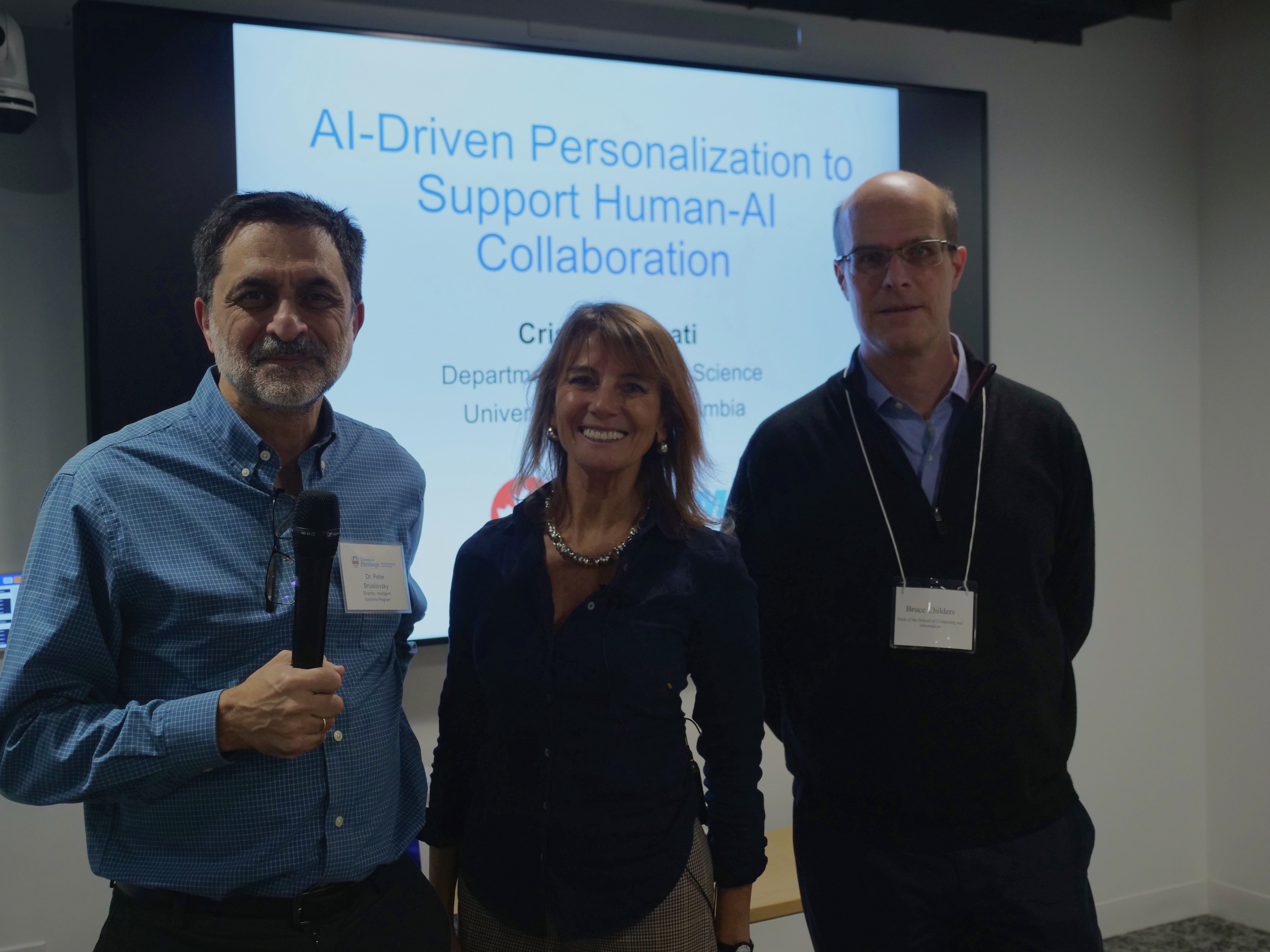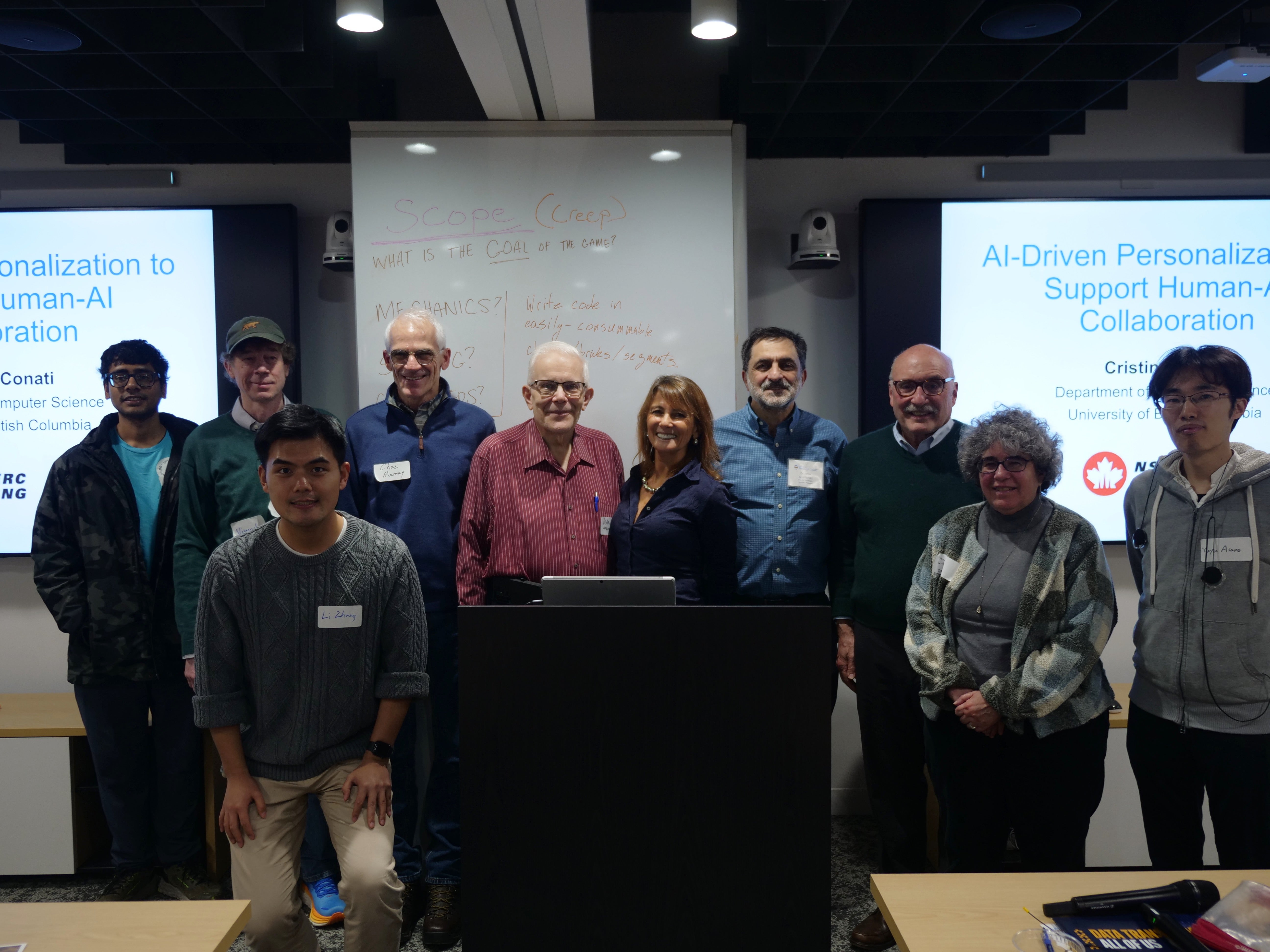March 10, 2025
On Feb. 12, 2025, the School of Computing and Information (SCI) hosted Dr. Cristina Conati (SCI ’99) for the final 2024-25 Dean’s Spotlight Series event, where she shared her research in personalized AI systems and Human Computer Interaction (HCI).
 Conati's journey into AI research began in the late 1980s while earning her master’s at the University of Milan, when the field was still in its early stages. She later pursued her PhD at the University of Pittsburgh, where she collaborated with a professor studying AI-human interaction for her thesis. This experience sparked her passion for the field and heavily influenced the direction of her future work.
Conati's journey into AI research began in the late 1980s while earning her master’s at the University of Milan, when the field was still in its early stages. She later pursued her PhD at the University of Pittsburgh, where she collaborated with a professor studying AI-human interaction for her thesis. This experience sparked her passion for the field and heavily influenced the direction of her future work.
“I love how interdisciplinary this research is: it combines information about technology, cognition, the human condition, and more,” Conati explained.
What is personalized Human-AI interaction?
When navigating a complex digital interface, problem, or question, Conati’s work focuses on developing computer systems that detect areas of user confusion and provide clarity. For example, an Intelligent Pedagogical Agent (IPA) is essentially an AI study buddy – this type of system can provide guidance in each step to solving problems in geometry, computer science, physics, and more. By giving the system well defined solutions and a clear definition of correctness, it can give feedback to the user each step of the process: it can suggest phrases like 'please consider this option' or 'try a different operator here'.
Another area of Conati’s research is Personalized Guidance to Visualization Processes: her example during her Dean’s Spotlight Series presentation involved using eye-tracking to help a user better understand a set of graphs that pairs with a block of text. By tracking a user’s biometrics such as gaze and pupil dilation, along with perceptual cues such as areas of transition and attention levels, AI systems use data to determine how they can make the information on the screen most digestible for the viewer. So, the system may highlight the corresponding graph next to the written data they’re reading and dim the surrounding visual stimulation.
By adapting to users' needs and offering personalized support, these systems foster a sense of trust between humans and technology, helping to bridge the gap between AI and human cognition in a way that feels intuitive and reliable.
"What’s most important is keeping humans in the loop," Conati explained. "We often use focus groups to understand what AI explanations users need, what confuses them, and what information they find most valuable."
By responding directly to human needs, HCI ensures that technology enhances the abilities of the humans that use it. It can act as a personalized tutor while a student does their schoolwork, create personalized health information by collecting the data of its users, create a ‘smart home’ that adapts to the needs of its inhabitants, and many more possibilities.
Current Work
Conati is now a computer science professor at British Columbia University, where she continues to teach AI and its relationship to cognitive systems. Despite all of the complex technological problems she had to face throughout her years of research, she noted that the most difficult decision she ever made in her career was to be a professor. Conati was unsure about staying in academia after graduation, concerned that it might be too demanding or very different from the type of work she was used to.
 “I always try to take risks and follow my intuition – it is better to feel disappointment than regret,” Conati said, noting the advice that helped her decide on her path in academia.
“I always try to take risks and follow my intuition – it is better to feel disappointment than regret,” Conati said, noting the advice that helped her decide on her path in academia.
Conati said that becoming a professor has been one of the most formative turning points in her career. She finds fulfillment in teaching others and enjoys sharing the importance of this field of work.
Furthermore, Conati enjoyed sharing this research in the Dean’s Spotlight Series with Pitt students, knowing that some of them may already be involved with interactive design programs, and she hopes to inspire more people to get involved with this track. Plus, coming to the University of Pittsburgh was a full circle moment where Conati was able to give back to the institution that played such a pivotal role in her career.
As AI continues to evolve, it is important that we create systems that aid people’s understanding of the new technology at hand. By introducing these ideas to a younger audience and embedding them into computer science education, we can plant the seeds for transformation in the field of AI, envisioning a future where AI studies meaningfully consider the experiences of the humans who interact with it.
Thank you to Dr. Cristina Conati, the Intelligent Systems Program, and Pitt's Learning Research and Development Center for this insightful Dean’s Spotlight Series event!
For more information, watch the recording of Conati's 2024-25 Dean’s Spotlight Series talk.
